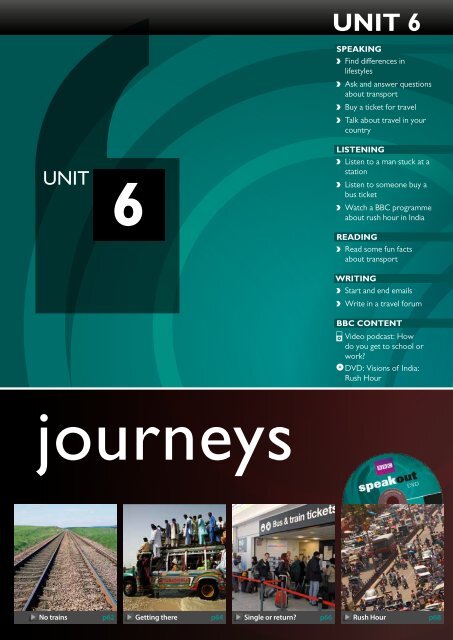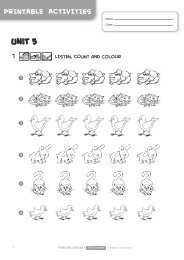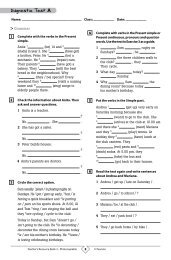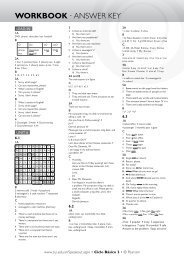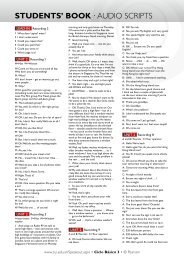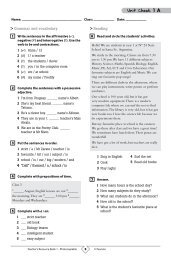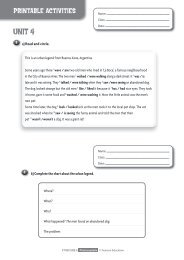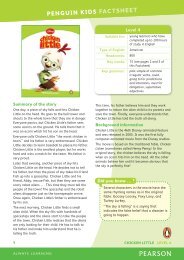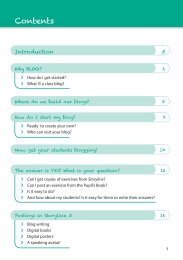Journeys - Pearson ELT
Journeys - Pearson ELT
Journeys - Pearson ELT
Create successful ePaper yourself
Turn your PDF publications into a flip-book with our unique Google optimized e-Paper software.
UNIT 6<br />
UNIT<br />
6<br />
SPEAKING<br />
Find differences in<br />
lifestyles<br />
Ask and answer questions<br />
about transport<br />
Buy a ticket for travel<br />
Talk about travel in your<br />
country<br />
LISTENING<br />
Listen to a man stuck at a<br />
station<br />
Listen to someone buy a<br />
bus ticket<br />
Watch a BBC programme<br />
about rush hour in India<br />
READING<br />
Read some fun facts<br />
about transport<br />
WRITING<br />
Start and end emails<br />
Write in a travel forum<br />
BBC CONTENT<br />
Video podcast: How<br />
do you get to school or<br />
work?<br />
DVD: Visions of India:<br />
Rush Hour<br />
journeys<br />
No trains p62 Getting there p64 Single or return? p66<br />
Rush Hour<br />
p68
6.1<br />
NO TRAINS<br />
GRAMMAR | there is/are<br />
VOCABULARY | places<br />
HOW TO | ask about places<br />
VOCABULARY places<br />
1A Match the words in the box with<br />
pictures A–H.<br />
internet café C newsagent’s hotel<br />
snack bar restaurant pharmacy<br />
payphone cash machine<br />
A<br />
B<br />
C<br />
D<br />
E<br />
F<br />
G<br />
€<br />
H<br />
62<br />
B 6.1 Listen to places A–H and underline<br />
the stressed syllable(s). Then listen and repeat.<br />
internet café<br />
C Work in pairs and take turns. Ask and answer about<br />
the pictures in Exercise 1A.<br />
A: What’s G?<br />
B: It’s a cash machine. What’s ... ?<br />
➠ page 144 PHOTObank<br />
listening<br />
2A Look at the photo. What’s the problem? Do you like<br />
train travel? What is good and what is bad about it?<br />
B 6.2 Listen to the conversations and number the<br />
places in Exercise 1A in the order you hear them. Two<br />
places are not in the conversations.<br />
payphone 1<br />
C Listen again and underline the correct alternative.<br />
1 The weather is cold/bad.<br />
2 The man’s phone is dead/broken.<br />
3 The internet café is/isn’t in the station.<br />
4 The restaurants are closed/expensive.<br />
5 The Charlotte Street Hotel is full/expensive.<br />
speakout TIP<br />
Before you do an exercise, check new words. Try to guess<br />
the meaning, ask your teacher or another student or check<br />
in your dictionary.<br />
grammar there is/are<br />
3A Complete the tables with the words in the box.<br />
’s Are There are Is there aren’t<br />
+ There<br />
–<br />
3<br />
?<br />
5<br />
1 ’s a payphone over there.<br />
2<br />
two hotels near here.<br />
isn’t<br />
an internet café.<br />
4<br />
any trains.<br />
a train to Paris tonight?<br />
there<br />
6<br />
any restaurants in the station?<br />
+ Yes,<br />
– No,<br />
7<br />
is<br />
are.<br />
isn’t.<br />
aren’t.<br />
B 6.3 Listen and check.<br />
C Listen again and underline the main stress in each<br />
sentence. Then listen and repeat.<br />
➠ page 128 LANGUAGEbank
6.1<br />
SPEAKING<br />
6 Work in pairs. Student A: look at the picture on page<br />
151. Student B: look at the picture on page 152.<br />
WRITING starting and ending an email<br />
7A Read the email. Is the email to the woman’s manager,<br />
friend or husband?<br />
Hi Ron,<br />
I have good news and bad news. There aren’t any trains<br />
tonight because the weather’s very bad. That’s the bad<br />
news. So what’s the good news? I’m in a very good hotel<br />
and there’s a nice restaurant, too. Yes, it’s expensive, but I<br />
have the company credit card.<br />
Give the children a goodnight kiss from me. See you<br />
tomorrow.<br />
Love,<br />
Clare<br />
B Complete the table with phrases for starting and<br />
ending an email.<br />
Hi Valentina, Best wishes, Love, Hello, Take care,<br />
Dear Jack, See you soon, Dear Mr Wilson,<br />
Regards,<br />
PRACTICE<br />
4A Complete the sentences about a class with There’s,<br />
There are, There isn’t or There aren’t.<br />
1 There are three students with black shoes. (+)<br />
2 one person with a red T-shirt. (+)<br />
3 a whiteboard. (–)<br />
4 two women in this room. (+)<br />
5 a book on the teacher’s desk. (+)<br />
6 any dictionaries. (–)<br />
B Work in pairs. Which sentences are true about your<br />
class?<br />
5A Work in pairs. Student A: write questions about<br />
places near the class. Student B: write questions about<br />
places near Student A’s home.<br />
1 snack bar?<br />
Is there a snack bar near here?<br />
2 internet café?<br />
3 pharmacy?<br />
4 any restaurants?<br />
5 cash machine?<br />
6 any clothes shops?<br />
B Work in pairs and take turns. Ask and answer the<br />
questions.<br />
A: Is there a snack bar near here?<br />
B: Yes, there’s a good snack bar. It’s two minutes from here.<br />
Its name is …<br />
to a<br />
boyfriend/<br />
girlfriend/<br />
husband/wife<br />
to a friend<br />
Start Hi Valentina, Hi Valentina,<br />
to your<br />
manager<br />
End Best wishes, Best wishes,<br />
8A Work in pairs. Which problems often happen to you<br />
when you travel by plane?<br />
plane is late<br />
you’re ill<br />
no passport<br />
no planes<br />
food is expensive<br />
no ticket<br />
no restaurants<br />
B Choose two of the problems above. Write an email<br />
from the airport to a friend or to your manager. Write<br />
about your problems.<br />
C Read other students’ emails. Which situation is really<br />
bad?<br />
63
6.2<br />
GETTING THERE<br />
GRAMMAR | a/an, some, a lot of, not any<br />
VOCABULARY | transport<br />
HOW TO | talk about transport<br />
VOCABULARY transport<br />
1A Write the transport words in the box<br />
under pictures A–H.<br />
bus train plane taxi underground<br />
car bike motorbike<br />
A bus B C<br />
D<br />
F G H<br />
B Work in pairs and answer the questions.<br />
1 How do you come to class?<br />
By bus or sometimes I walk.<br />
2 What’s your favourite type of transport?<br />
Motorbike.<br />
3 What type of transport do you never use?<br />
I never use a bike.<br />
reading<br />
2A Read the text. Which fact is not true?<br />
B Write the name of the place or<br />
transport.<br />
1 It doesn’t have any stations. Bhutan<br />
2 It’s the number one place for bikes.<br />
3 In London, they’re usually black.<br />
4 It’s a noisy place to play.<br />
5 Men don’t use these.<br />
6 They have two floors and stairs.<br />
E<br />
Transport facts...<br />
More and more people are on the move. From Moscow<br />
to Beijing, and from Amsterdam to Thailand, we look at<br />
transport facts around the world.<br />
There are 3 million cars in Moscow and 22 pink taxis. The pink<br />
taxis are for women and the drivers are women.<br />
There are double-decker buses in the UK, Germany, Hong Kong<br />
and Singapore. There are double-decker trains in a lot of countries<br />
including Switzerland, Australia and the USA.<br />
4.3 million people go by subway (underground) every day in New<br />
York City.<br />
There aren’t any trains in the country of Bhutan in Asia.<br />
In Saudi Arabia some hotels have London taxis but they are white<br />
not black.<br />
In China people often sit in the front seat of taxis.<br />
People usually travel around Venice by car.<br />
In Thailand, there’s an airport with a golf course in it.<br />
Amsterdam is the bike capital of the world. 40% of travel in this<br />
city is by bike.<br />
C Work in pairs and discuss. Which facts<br />
are surprising?<br />
It’s surprising that there are taxis for<br />
women. It’s a good idea.<br />
64
6.2<br />
grammar a/an, some, a lot of, not any<br />
3A Look at the sentences. Match the words in bold with<br />
pictures A–D.<br />
1 In Thailand, there’s an airport with a golf course in it. B<br />
2 There are double-decker trains in a lot of countries.<br />
3 There aren’t any trains in the country of Bhutan.<br />
4 In Saudi Arabia some hotels have London taxis.<br />
A<br />
B<br />
C<br />
D<br />
SPEAKING<br />
B Complete the table with ’s, are, isn’t or aren’t.<br />
+<br />
–<br />
There<br />
There<br />
a<br />
some<br />
a lot of<br />
an<br />
any<br />
train at four o’clock.<br />
buses this afternoon.<br />
taxis.<br />
airport here.<br />
cars in the centre.<br />
C 6.4 Listen and check.<br />
D Listen again and underline the stressed words. Then<br />
listen and repeat.<br />
➠ page 128 LANGUAGEbank<br />
PRACTICE<br />
4A Underline the correct alternative.<br />
1 There’s a/an airport.<br />
2 There are some/any stations.<br />
3 There aren’t a lot/any taxis.<br />
4 There are a lot/some of motorbikes.<br />
5 There isn’t a/some bus station.<br />
6 There are any/some buses at night.<br />
7 There aren’t some/any problems with cars in the centre.<br />
8 There are any/a lot of bikes.<br />
B Work alone. Make the sentences true for your town/<br />
city or a town/city you know.<br />
5A Work in pairs. Student A: turn to page 150. Student<br />
B: ask questions to complete the information for Venice<br />
and London.<br />
B: Is there a train from the airport to Venice?<br />
A: No, there isn’t.<br />
train / from<br />
the airport?<br />
underground?<br />
airport bus?<br />
other<br />
information?<br />
Venice<br />
London (Heathrow)<br />
B Change roles. Student B: answer Student A’s questions<br />
about Barcelona and Edinburgh.<br />
A: Is there a train from the airport to Barcelona?<br />
B: Yes, there is. It’s three euros.<br />
train / from the<br />
airport?<br />
underground?<br />
Barcelona<br />
€3 no✗<br />
yes but not from<br />
the airport<br />
Edinburgh<br />
no<br />
airport bus? €5 £4<br />
other<br />
information?<br />
taxi, €30 taxi, £15<br />
C What’s the best way to go from the airport to the<br />
centre in these four cities?<br />
C Work in pairs and take turns to ask questions. Student<br />
A: you are a visitor to the town/city.<br />
A: Is there an airport?<br />
B: Yes, there are two airports.<br />
65
6.3<br />
SINGLE OR RETURN?<br />
FUNCTION | buying a ticket<br />
VOCABULARY | travel<br />
LEARN TO | check numbers<br />
VOCABULARY travel<br />
1A Work in pairs. Do you like long bus<br />
journeys? Why/Why not?<br />
B Look at the words in the box. Which<br />
things can you see in the photos?<br />
3A<br />
6.6 Complete the conversation. Then listen and check.<br />
Student A<br />
Student B<br />
A ticket 1 Amsterdam,<br />
please.<br />
Single or return?<br />
passenger ticket office gate<br />
single (ticket) return (ticket)<br />
monthly pass<br />
C Work in pairs and take turns to ask and<br />
answer.<br />
A: What’s this?<br />
B: It’s a gate. What’s ... ?<br />
Return, 2 .<br />
Yes.<br />
Tomorrow afternoon.<br />
Leaving today?<br />
When do you want to<br />
3<br />
back?<br />
66<br />
FUNCTION buying a ticket<br />
2 6.5 Listen to the conversation at a<br />
bus station and tick the correct answer.<br />
1 She wants:<br />
a) a single b) a return c) two returns<br />
2 She wants a ticket for:<br />
a) today b) tomorrow c) today and<br />
tomorrow<br />
3 It costs:<br />
a) €25 b) €29 c) €39<br />
4 It leaves at:<br />
a) 2.30 b) 2.15 c) 3.30<br />
5 It arrives at:<br />
a) 3.15 b) 4.15 c) 4.45<br />
What time’s the 4<br />
What time 5 it arrive in<br />
Amsterdam?<br />
6<br />
a lot.<br />
bus?<br />
OK. That’s twenty-nine euros.<br />
There’s one at<br />
half past two.<br />
At quarter past four. Here’s<br />
your ticket.<br />
The bus leaves 7 gate<br />
twenty‐four.<br />
B Listen again and say the sentences at the same time.<br />
C Work in pairs and take turns. Practise the conversation.<br />
➠ page 128 LANGUAGEbank
6.3<br />
LEARN TO check numbers<br />
4A 6.7 Listen and underline the stressed syllable in<br />
the numbers.<br />
B: The bus leaves from gate twenty-four.<br />
A: Sorry? Gate thirty-four?<br />
B: No, gate twenty-four.<br />
A: Thanks a lot.<br />
B Listen again and repeat.<br />
speakout TIP<br />
Use stress to check and correct numbers. Sorry, fifty-five?<br />
No, fifty-nine.<br />
C Work in pairs and take turns. Practise the<br />
conversations.<br />
1 A: That’s €€250.<br />
B: Sorry? 240?<br />
A: No, 250.<br />
2 B: It’s bus number 72.<br />
A: Sorry? 72?<br />
B: Yes, that’s right. 72.<br />
3 A: The train leaves at 5 o’clock.<br />
B: Sorry? 9 o’clock?<br />
A: No, 5 o’clock.<br />
5A Write down two prices, two train times and two bus<br />
numbers. Don’t show your partner.<br />
B Work in pairs and take turns. Student A: read your<br />
numbers fast. Student B: repeat the numbers to check.<br />
A: Two dollars and forty cents.<br />
B: Sorry? Ten dollars and forty cents?<br />
A: No, two dollars and forty cents.<br />
SPEAKING<br />
6A Work in pairs. Student A: look at the information<br />
below. Student B: turn to page 150.<br />
Student A: you are at a bus station in Amsterdam. You<br />
want to buy a ticket. Ask Student B questions to complete<br />
the table.<br />
ticket<br />
price<br />
time of next bus<br />
gate<br />
arrival time<br />
a single to Brussels<br />
B Change roles. Student A: you work in a ticket office<br />
in the central train station in Amsterdam. Look at the<br />
information and answer Student B’s questions.<br />
ticket<br />
a return to Paris<br />
price €174<br />
time of next train<br />
8.30a.m.<br />
platform 6<br />
arrival time<br />
12.45p.m.<br />
67
6.4<br />
SPREAD RUSH HOUR TITLE<br />
DVD preview<br />
1A What do you know about India? Look at the<br />
words in the box below. Cross out the one which is<br />
not in or from India.<br />
1 Karachi, Mumbai, Delhi<br />
2 Mahatma Gandhi, Omar Sharif, Mother Teresa<br />
3 Bollywood, coffee, yoga<br />
4 River Ganges, Taj Mahal, Machu Picchu<br />
5 daal, nan, tempura<br />
B Read the programme information and look at the<br />
photos. How do people go to work and school in<br />
India?<br />
Visions Of India:<br />
Rush Hour<br />
Each programme in the BBC’s Visions Of<br />
India shows a different side of this country<br />
of one billion people. This programme looks<br />
at how millions of working Indians travel to<br />
work and school every day.<br />
DVD view<br />
2A Watch the DVD to check your ideas in<br />
Exercise 1B.<br />
B Complete the sentences with the adjectives<br />
in the box below.<br />
popular crowded slow dangerous noisy<br />
expensive<br />
1 A lot of people like it. It’s popular .<br />
2 It isn’t quiet. It’s _______.<br />
3 It costs a lot. It’s _______.<br />
4 It isn’t safe. It’s _______.<br />
5 It has a lot of people. It’s _______.<br />
6 It isn’t fast. It’s _______.<br />
C Watch the DVD again and underline the adjectives<br />
you hear for each type of transport.<br />
1 trains – crowded, popular, noisy<br />
2 bikes – dangerous, fast, slow<br />
3 motorbikes – fast, noisy, dangerous<br />
4 tuk-tuks – popular, fast, noisy<br />
5 taxis – fast, safe, expensive<br />
68
speakout a travel survey<br />
3A Work in pairs and discuss. How do people in your<br />
country travel in cities and in the countryside?<br />
B 6.8 Listen to a student describe travel in his<br />
country and complete the table.<br />
in a big city<br />
1<br />
2<br />
3<br />
in the countryside<br />
C Listen again and tick the key phrases you hear.<br />
keyphrases<br />
I live in (London) but I’m from (the countryside).<br />
There’s a good public transport system.<br />
(A lot of/Some people) use (the underground/buses).<br />
Some people go to work by (bus/bike).<br />
The best way to travel is by (car/underground).<br />
People also go by (bus).<br />
In (my village/the city), I go everywhere by (car/bike).<br />
1<br />
2<br />
3<br />
4A Work with a new partner and talk about the<br />
different ways people travel in your country. Use the key<br />
phrases to help.<br />
B Work in groups and tell other students.<br />
writeback a travel forum entry<br />
5A A travel website asks people to write about<br />
transport in their town/city. Read the forum<br />
entry. How does the writer usually travel?<br />
I live in Kobe, Japan and I work in Osaka. I<br />
think the best way to travel is by train. I go<br />
by the JR train line every morning. There<br />
are sometimes ten trains every hour. It’s<br />
about thirty minutes from Kobe to Osaka.<br />
I have a monthly pass but I think a single<br />
ticket is about 500 yen.<br />
In Kobe, people travel by car, but there’s<br />
a good public transport system, so a lot of<br />
people use buses and the underground.<br />
A one-day tourist pass is 1,000 yen. I<br />
live near the centre so I usually walk<br />
everywhere. Kobe is a small city, and it’s a<br />
good city for walkers.<br />
B Write about transport in your town/city or a<br />
town/city you know for the travel website. Write<br />
80–100 words.<br />
69
6.5<br />
LOOKBACK<br />
PLACES<br />
1A Add the vowels to the places.<br />
1 i nt e rn e t c a f é<br />
2 r__st__ __r__nt<br />
3 ph__rm__cy<br />
4 n__ws__g__nt’s<br />
5 p__yph__n__<br />
6 c__sh m__ch__n__<br />
7 h__t__l<br />
8 sn__ck b__r<br />
B Work in pairs. Write a thing/<br />
activity connected to the places<br />
above.<br />
internet café – email<br />
C Work in groups. Student A: say<br />
one thing/activity. Other students:<br />
guess the place.<br />
A: Email.<br />
B: Internet café.<br />
A: That’s right.<br />
there is/are<br />
2A Complete the questions asked<br />
in a hotel with Is there or Are there.<br />
1 Is there a swimming pool?<br />
2 a restaurant in the<br />
hotel?<br />
3 two beds in my room?<br />
4 a guided tour of the<br />
city tomorrow?<br />
5 any cash machines near<br />
the hotel?<br />
6 any other hotels near<br />
here?<br />
B Match answers a)–f) with the<br />
questions above.<br />
a) No, , but the city isn’t<br />
very interesting.<br />
b) Yes, but they’re all full.<br />
c) Yes, , but the water is<br />
very cold.<br />
d) Yes, , but it’s closed<br />
now. It’s open for dinner.<br />
e) No, . only<br />
one bed.<br />
f) No, , but<br />
one in the hotel.<br />
C Complete the answers above<br />
with there is/’s, there are, there<br />
isn’t or there aren’t.<br />
TRANSPORT<br />
3A Circle eight transport words.<br />
Q P B H I U M<br />
B U S F H N O<br />
I A S N B D T<br />
K P L A N E O<br />
E E G J T R R<br />
K Z Y G Z G B<br />
E O K R E R I<br />
T R A E N O K<br />
A T R C U U E<br />
X T R A I N H<br />
I W S R S D K<br />
B Work in groups and take turns.<br />
Student A: draw a picture of one<br />
of the things in Exercise 3A. Other<br />
students: guess what it is.<br />
A/AN, SOME, A LOT OF, NOT ANY<br />
4A Find and correct the mistakes<br />
in the sentences.<br />
In this book:<br />
of<br />
1 A lot pages don’t have photos.<br />
2 Some page have six photos.<br />
3 There’s an Spanish word on page 6.<br />
4 There’s blue glove on page 32.<br />
B Work in pairs. Which sentences<br />
above are true? Change the others<br />
to make them true.<br />
C Work in pairs. Write four more<br />
sentences about the book, but only<br />
one true sentence. Use a/an, some,<br />
a lot of and not any.<br />
D Work in groups and take turns<br />
to read out your sentences. Which<br />
sentences are true?<br />
TRAVEL<br />
5 Complete the words.<br />
1 You buy a ticket at the ticket<br />
of .<br />
2 The people on the bus are<br />
pas s.<br />
3 The bus leaves from a ga .<br />
4 A ticket from A to B is a<br />
si .<br />
5 A ticket from A to B to A is a<br />
re .<br />
6 A ticket for four weeks is a<br />
mo<br />
pass.<br />
buying a ticket<br />
6A Complete the conversation.<br />
A: 1 single / Lisbon, / please.<br />
A single to Lisbon, please.<br />
B: For when?<br />
A: 2 I / want / go / tomorrow<br />
morning.<br />
B: OK. That’s €39.<br />
A: 3 What time / first bus?<br />
B: There’s one at 10.40.<br />
A: 4 What time / it / arrive / Lisbon?<br />
B: At 12.15.<br />
A: 5 Where / it / leave / from?<br />
B: It leaves from gate 34.<br />
A: 6 Thanks / lot.<br />
B Work in pairs and practise the<br />
conversation.<br />
VIDEO PODCAST<br />
Watch people talking<br />
about how they get<br />
to school or work on<br />
ActiveBook or on the<br />
website.<br />
Authentic BBC interviews<br />
www.pearson<strong>ELT</strong>.com/speakout<br />
70


